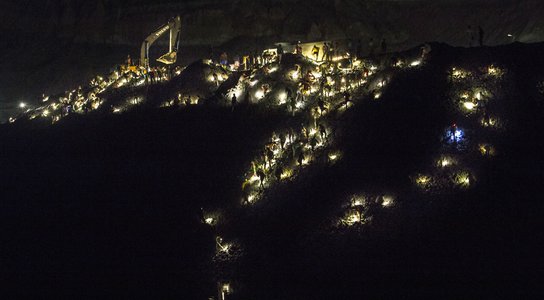Reports of over 50 killed by a mine companies’ waste dump
collapsing in Hpakant, Kachin State, reflect the staggering levels of abuse and
impunity in Myanmar’s multi-billion dollar jade business.
“Big companies licenced by the government are making a killing. They are grabbing jade worth tens or hundreds of millions a year, while leaving locals and migrant workers to run the gauntlet of deadly landslides caused by the companies’ reckless dumping practices,” said Mike Davis, Asia Director at Global Witness. “The government must act to demonstrate that it is serious about ending the impunity that has turned Hpakant, the source of the ‘stone of heaven’, into a small corner of hell for the people that live there.”
In late October 2015, the Global Witness investigation ‘Jade: Myanmar’s “big state secret”’ revealed how industrial scale mining by companies controlled by military families and companies, ‘crony’ tycoons and drug lords has made Hpakant a dystopian wasteland where locals are literally having the ground cut from under their feet. If, like several other deadly accidents that occurred in 2015, this one has been caused by companies’ destructive waste-dumping practices, those firms need to be held to account before the law.
Right now the jade business is substantially controlled by political hardliners who command no popular support but might attempt a comeback or campaign of sabotage if they have the means to finance it. Prising the jade from their grip must be one of the top priorities for the new government if it is to deliver the lasting freedoms, peace and prosperity voters have demanded.
The Thein Sein government took the important step in 2014 of signing Myanmar up to the Extractive Industries Transparency Initiative (EITI), a global scheme designed to reduce corruption and increase transparency in the oil gas and mining businesses. Myanmar’s first EITI report is due out in January. As part of the EITI process, the government should require jade and other natural resource concession holders and companies bidding for concessions to disclose publicly the identities of the individuals by whom they are ultimately owned – the ‘beneficial owners’ – to tackle the anonymity which affords these companies such impunity.
In addition, the peace process aimed at bringing to an end the armed conflict in Kachin State between the Myanmar government and the Kachin Independence Army / Kachin Independence Organisation (KIA/KIO) needs to address the question of who will own and manage jade and other natural resources in Kachin. The experience of a 17 year ceasefire that collapsed in 2011 shows that without this, and other substantive questions being addressed, a lasting peace will prove elusive.
The Global Witness report examined the workings and control structures of the country’s secretive jade business. The report’s key findings are as follows:
1. The jade business is worth far more than previously thought; possibly as much as US$31 billion in 2014. Chinese government trade data for 2014 indicates that the category of gemstone imports from Myanmar that covers – and overwhelmingly comprises – jade was worth US$12.3 billion (1). However, this represents less than a third of Myanmar’s officially declared jade production by weight, even though China is where almost all Myanmar’s jade ends up (2).
Using Myanmar government production and sales data, and an estimate of the proportions of high, medium and low-grade jade as shares of production developed by Proximity Designs and the Harvard Ash Center, we undertook a new and in-depth analysis of the value of the jade business. Our estimates put the value of Myanmar’s official jade production in 2014 alone as high as US$31 billion. An alternative methodology, which uses an average price per kilogram of jade derived from the Chinese import data yields a figure of US$38 billion.
Our intention, in publishing some specific figures, based on the incomplete data available, is not so much to have the last word on the value of Myanmar’s jade business as to trigger a debate and encourage the full disclosure of the information the public needs to make more definitive assessments on an ongoing basis.
2. The jade business is dominated by a rogues’ gallery of military hardliners, army companies, ‘crony’ tycoons and drug lords. These include the families of former dictator Than Shwe, a serving minister, two deputy ministers and a former ruling party general secretary. Other key players include infamous military conglomerate Myanma Economic Holdings Limited and a previously obscure but very powerful group of companies known as Ever Winner, which has close connections with Myanmar’s largest bank: KBZ.
The report argues that, in its current state, the jade business offers a giant slush fund to some of the most dangerous opponents of democracy and peace in Myanmar today. Meanwhile, local people are getting next to no benefits. This gross injustice is contributing to the conflict in Kachin State between the government armed forces (Tatmadaw) and the KIA/KIO.
Global Witness is now preparing to publish a follow-up report on how Myanmar’s most infamous narcotics kingpin, Wei Hsueh Kang, has used a web of opaque company structures to take a dominant role in Myanmar’s jade business.
Contact: Mike Davis [email protected], +855 7797 5002; Oliver Courtney [email protected], +44 (0)7912 517147.
/ ENDS
Notes to editor:
1) Chinese trade data taken from CTI (China Trade Institute) and UN Comtrade Database. See Appendix 1 of ‘Jade: Myanmar’s “big state secret”’ at https://www.globalwitness.org/reports/myanmarjade, for further details of data used and analysis conducted.
2) See Appendix 1 of ‘Jade: Myanmar’s “big state secret”’ at https://www.globalwitness.org/reports/myanmarjade, for details of calculations.
You might also like
-
Report Jade: Myanmar's "Big State Secret"
As Myanmar's historic election approaches, our report reveals a secret jade trade worth up to US$31 billion, and controlled by military elites and drug lords.
-
Blog post Will Myanmar’s Government walk its talk on extractive industries reform? Jade trade will be key test
Myanmar’s exports of the jade mined in northern Kachin State are estimated to be worth US$6-9 billion per year. But the government’s tax take is paltry
-
Report The Shell Starts To Crack?
Real owners of Myanmar’s oil and gas blocks come forward.